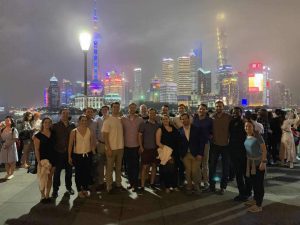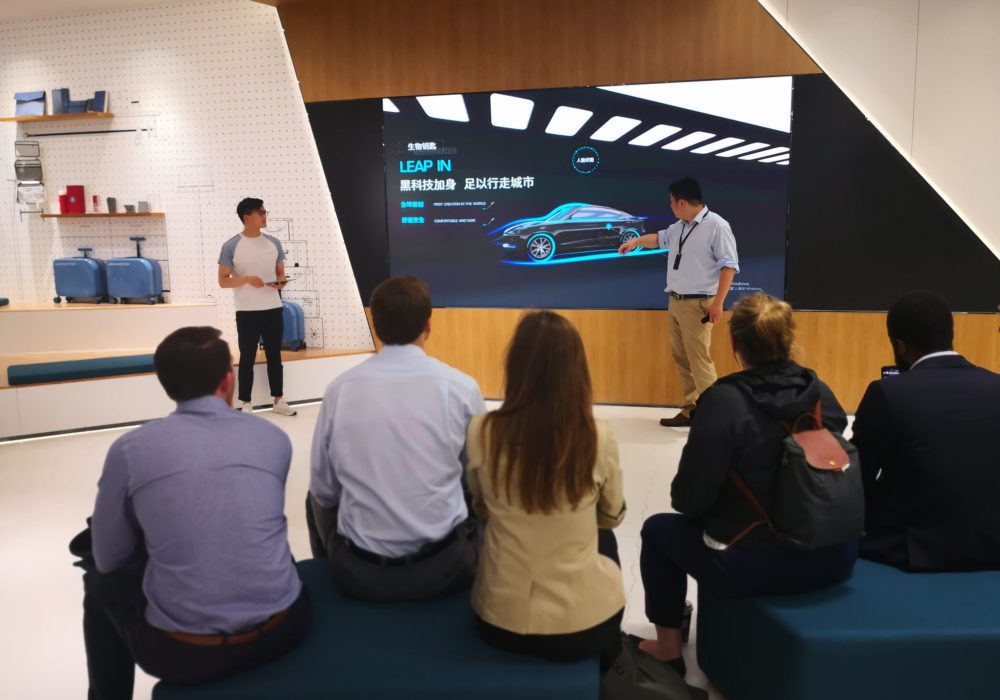 Michael Reed (Class of 2020) came to Darden after working for Accenture for over five years. Between wrapping up his first year at Darden and heading out to California to start a product data operations internship with Facebook, Michael travelled to China with a group of his classmates on a Darden Global Immersion Course. He shared his key takeaways in his own words:
Michael Reed (Class of 2020) came to Darden after working for Accenture for over five years. Between wrapping up his first year at Darden and heading out to California to start a product data operations internship with Facebook, Michael travelled to China with a group of his classmates on a Darden Global Immersion Course. He shared his key takeaways in his own words:
The course in Shanghai was one of the most valuable experiences in my academic and professional career so far. Taking advantage of international travel and learning opportunities at Darden was a priority for me and this trip did not disappoint. During my visit to China, I gained a much greater appreciation for the culture, the business environment, and the challenges multinational corporations face doing business in the country. Specifically, I was interested to see how innovation is being applied in China, and what that means for both multinational companies that are entering the Chinese market, as well as domestic companies that are competing against Chinese companies within the United States. During one of our visits, the speaker made a statement that resonated with me. She said, “Multinational companies cannot afford to not be in the Chinese market. However, it is not because of anticipated profits. Instead, these companies are viewing this expansion as a necessity to get access to the innovation that is happening locally.”
The root of this innovation also intrigued me. As with many of the topics that we discussed throughout our company visits, the central government has a significant role in driving firms forward. From green energy to data science to semiconductors and high quality steel, there was a clear trend that the Chinese government is seeking to be as self-sustaining as possible, making itself less reliant on outside economic and political pressures. Rapid advancements in industries and technology that further this mission are given virtually unlimited resources (both financial and political capital) to make this vision a reality.
This strategy would not be successful without committed, competitive, and driven people to execute it. I met extremely motivated individuals who have bought into the new wave of nationalism that has engulfed the country. I was surprised to learn of the intense competitive culture that is pervasive throughout daily life in China. In childhood years, kids are stack ranked across the entire country. We also heard of the “9-9-6” work culture– working 12 hours a day, 6 days a week – in order to sustain the rapid growth. These schedules have resulted in extremely efficient employees who execute a focused vision and achieve the desired results.
Combining the strong central government’s vision with the rising culture of consumerism sets the framework for innovation. The final key ingredient that supports the  development of new discoveries in these firms is the ability to quickly iterate and scale. Chinese consumers have lower brand loyalty and are more likely to be early adopters. On the corporation side, at Leap Motors, we heard how the multi-national automakers are slower at innovation because they create spreadsheets and business cases to measure NPV whereas Chinese companies just move forward quickly and iterate along the way (sorry, Marc Lipson!). Additionally, access to over a billion people enables these companies to find a niche market that is underserved (and there are many), build a product, and gain incredible economies of scale.
development of new discoveries in these firms is the ability to quickly iterate and scale. Chinese consumers have lower brand loyalty and are more likely to be early adopters. On the corporation side, at Leap Motors, we heard how the multi-national automakers are slower at innovation because they create spreadsheets and business cases to measure NPV whereas Chinese companies just move forward quickly and iterate along the way (sorry, Marc Lipson!). Additionally, access to over a billion people enables these companies to find a niche market that is underserved (and there are many), build a product, and gain incredible economies of scale.
There are some potential pitfalls that the country might face in realizing its full potential. The government is very keen on maintaining stability, but as the country adopts more capitalistic economic reforms, the spread of income inequality may continue to increase. Additionally, there have already been signs that the Chinese economy is slowing from its unprecedented growth over the past few decades, which could affect how comfortable citizens are in the government’s holistic involvement in their daily lives.
Looking ahead to how I can apply this course to my career, it is obvious I will need to adopt a life-long habit of understanding the ongoing developments in the Chinese market. Specifically, I will evaluate opportunities to bring innovations that Chinese or multinational firms have invented for the Chinese market and see how I might successfully deploy them in the U.S. domestic market. First on my list: KFC China’s chicken taco shell! On a serious note, though, my final key takeaway from this visit is an appreciation for China’s culture and its people as well as a respect for how Chinese firms are increasingly making contributions that will ultimately benefit all of mankind.





